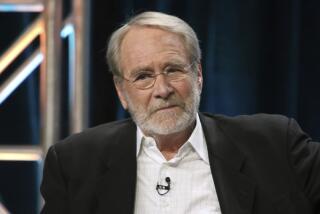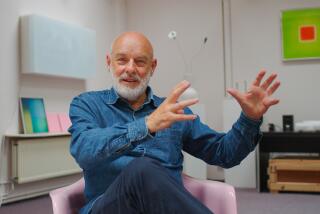It All Adds Up Now
What happens to a young boy who wakes up in the morning to find his naked Marxist father standing over his bed belting the Internationale? Well, Josh Kornbluth became a monologuist.
The Bay Area-based performer, who first broke through to widespread recognition with his 1992 show âRed Diaper Baby,â is an artist who knows well the meeting of the personal and the political. Itâs been the grist for his half-dozen shows to date, which have focused on growing up in New York during the 1960s and other autobiographical matters.
On Friday, Kornbluth will appear in Los Angeles for the first time since 1991, with two performances of his most recent solo, âThe Mathematics of Change,â at the California Plaza downtown. Also on the eveningâs bill will be fellow solo performer Jude Narita.
As the title of Kornbluthâs piece suggests, itâs about more than math.
âYou can either be someone who knows math or whoâs afraid of math and relate to it,â says the performer, speaking by phone from Dartmouth College in New Hampshire, where he is working on a series of educational math videos.
âItâs about trying to be the thing that youâre destined to be great at, and then finding out that youâre not great at it,â he says. âSo what do you do when you realize --that horrible feeling--that your huge ambition for yourself is not realistic?â
Math may have been the catalyst for Kornbluthâs own particular crisis, but âThe Mathematics of Changeâ is actually about what happens when childhood expectations donât add up to grown-up realities.
âItâs about getting the sense from my father that the world of my adulthood was going to be a fantastically beautiful and efficacious place,â Kornbluth says. âA lot of what happened, at least until my mid-30s, was that the world wasnât conforming to that. I had to follow my own, at best crab-like, process.â
Kornbluth, 38, grew up the son of a pair of old-school New York Communists who divorced when he was very young but maintained households in the same Washington Heights neighborhood. His father was a math teacher who often mouthed off to his bosses and was fired for his trouble, while his relatively more demure librarian mother counseled a more measured approach to the coming revolution.
After his years at the Bronx High School of Science, Kornbluth attended Princeton University, where he studied math before switching his major to political theory. Then, after graduation, he worked as a copy editor at the Boston Phoenix, an alternative weekly newspaper.
âMy ambition was to be a writer, but I had writerâs block,â Kornbluth recalls of a brief stint as a television critic unable to meet deadlines. âI had a horrible time writing. I felt terribly lonely.â
After leaving the paper in 1984, Kornbluth began experimenting with performing, first as host for a radio variety show called âThe Urban Happiness Hourâ and later with a political comedy revue called âThe Gramm-Rudman Act.â He also waded into the waters of stand-up but quickly found himself ill at ease in the cutthroat environment of comedy club open-mike nights.
Then in 1986, a friend took him to see a performance by monologuist Spalding Gray, and it turned out to be a revelation.
âI discovered from Spalding Gray that he improvises his stuff, and I thought, âOh, I donât have to write it!â â says Kornbluth, who now develops all his material through improvisational performances at small theaters and elsewhere. âHeâs the person who totally inspired me. I had no idea there was such a form.â
In 1987, Kornbluth moved to San Francisco, joining a number of friends who had also left Boston. He returned to stand-up and supported himself with odd jobs and temp work.
In 1989, Kornbluth wrote his first show, âJosh Kornbluthâs Daily Worldâ (the title is a reference to the name of a onetime Socialist newspaper), which explored his relationship to his Marxist father. And from there Kornbluth went on to write four more autobiographical shows, performing at small Bay Area venues and developing a loyal following.
One of his solos, âThe Moisture Seekers,â told the story of how Kornbluth lost his virginity. This was the work that Kornbluth presented in his one previous performance in Los Angeles, in 1991.
Kornbluth subsequently combined material from âDaily Worldâ and âMoisture Seekersâ into a two-act piece called âRed Diaper Baby,â which became his breakthrough hit. The piece won numerous positive notices when it was performed in New York in 1992.
After âRed Diaper Babyâ was optioned by Universal Pictures, Kornbluth was invited to work on the script at the Sundance Institute in Utah in 1994. The film has never been made, however.
Kornbluthâs next show--âHaiku Tunnel,â about his experiences working as a legal secretary--was also optioned (by Miramax), developed at Sundance in 1994 and later put on indefinite hold. Kornbluth, who was a featured artist in the 1996 HBO Comedy Festival in Aspen, Colo., is currently developing the piece as an independent film, which he hopes to begin shooting in the Bay Area in January.
âItâs sort of different from the other ones in that it has a plot,â he says. âI call it a screwball secretarial thriller.â
After âHaiku Tunnel,â Kornbluth wrote âThe Mathematics of Change,â which marks something of a return to the terrain of âRed Diaper Baby.â
âItâs related, from similar passions,â he says. âIn âRed Diaper Baby,â my father told me Iâd be a great Communist leader and a great lover of women. In the âMathematics of Change,â I go into this other thing he told me. When I was a little kid, I was great in math and my dad, who was a math teacher in middle school, told me I was going to be the greatest mathematician who ever lived.â
Writing about Kornbluthâs 1995 performance of âThe Mathematics of Changeâ at the performance venue P.S. 122 in New York, the New York Times called the show âexuberant . . . beneath its sometimes guffawing surface it tells a poignant story.â
Set at Princeton, the monologue tells of Kornbluthâs fateful first encounter with college math.
âWhen I got to college I took calculus and I hit the wall, as my father described it,â he says. âI was unable to understand it. It was a huge crisis.â
Writing on the blackboard throughout the performance to illustrate and explain his material, Kornbluth structures the piece in the form of a calculus class: functions, limits, differentiation and finally integration. Itâs a metaphor for his gradual understanding of the need to pursue his own intellectual calling.
âI go through these various discoveries,â Kornbluth says. âFirst, Iâm not doing well. Then I find out that my [teaching assistant] really couldnât care less that I donât get it. Thatâs one reason they go so fast--to weed out people like me.â
One intellectual hurdle in particular stopped Kornbluth in his tracks: âYou know how when you have .9 and .99 and .999, itâs getting closer and closer to 1? Well, if you put â.999 . . . ,â that indicates an infinite number of 9s. And what the T.A. tells all of us is that when you have an infinite number of 9s like that, you donât just get close to 1, you actually hit 1.â
If you donât follow the figuring, youâre not alone. Kornbluth didnât buy the logic either. And that was the beginning of the end.
âMy character doesnât believe it, and I didnât personally,â he says. âBut the way that calculus is often taught, you have to accept that in order to keep going.â
The difficulty, he says, is that the concept requires a leap of faith.
âNothing prepares you for this,â he says. âYou may have been great at adding up stuff. But then they go to this new level and they tell you that 2 plus 2 is 5.â
Of course, the concept also has larger symbolic resonances.
âFor me, personally, this very much relates to [my belief] that Iâm going to be great,â he says. âItâs like how you fall in love. Itâs there, itâs huge. There is no âapproaching approaching approaching.â â
*
âTHE MATHEMATICS OF CHANGE,â California Plaza, Watercourt, 300-350 S. Grand Ave., downtown. Date: Friday, noon. Kornbluth and Jude Narita perform at 8 p.m. Price: free. Phone: (213) 687-2159.
More to Read
The biggest entertainment stories
Get our big stories about Hollywood, film, television, music, arts, culture and more right in your inbox as soon as they publish.
You may occasionally receive promotional content from the Los Angeles Times.










